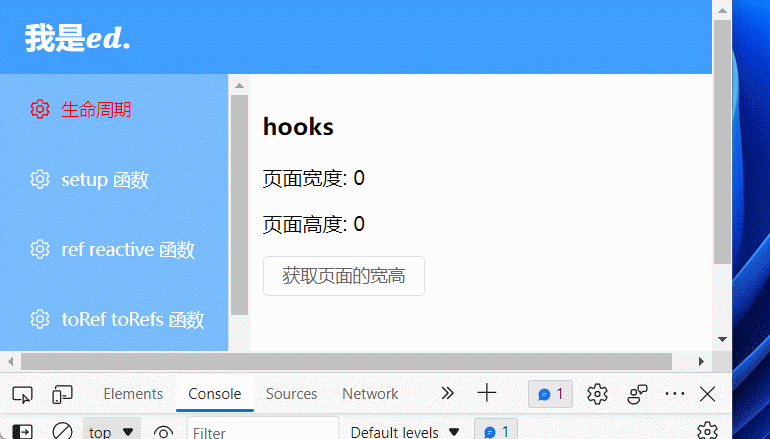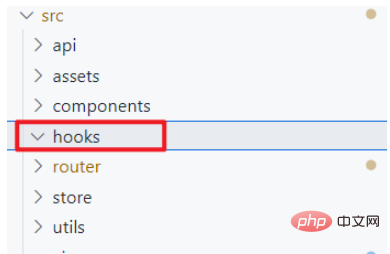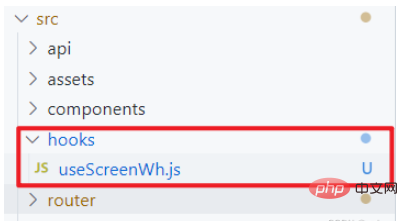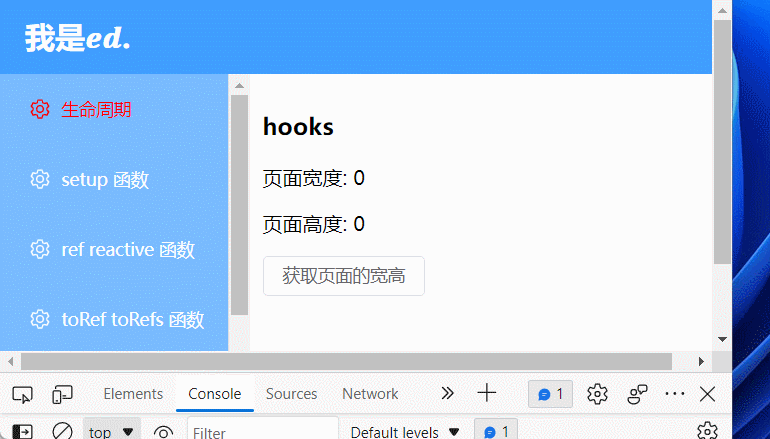How to use hooks in Vue3 projects
hooks Features
The hooks function in vue3 is equivalent to the mixin in vue2. The difference is that hooks are functions.
The hooks function in vue3 can improve the reusability of code and can be used in different components.
hooks function can be used with mixin, but it is not recommended.
Basic use of hooks
First of all, we don’t care about hooks. Ha, let’s write a small function first, which is to get the width and height value of the page. This is a common case to explain hooks. They are all veteran actors. , let’s do one too.
I won’t be verbose, let’s just write the code.
<template>
<h4 id="hooks">hooks</h4>
<p>页面宽度: {{screen.width}}</p>
<p>页面高度: {{screen.height}}</p>
<el-button @click="getWH">获取页面的宽高</el-button>
</template>
<script setup>
import { reactive } from 'vue'
const screen = reactive({
width: 0,
height: 0
})
const getWH = () => {
screen.width = document.documentElement.clientWidth
screen.height = document.documentElement.clientHeight
}
</script>
<style scoped>
</style>The above code is actually very simple. There are two labels to display the length and width of the visible page, and then there is a button to get the latest length and width for display.

This function can be implemented smoothly. If we need to implement this function on another page, it is also very simple. Just copy the above code directly to another page that needs to be implemented.
But
Have you found a problem? If you need a page, copy it once. If you need a page, copy it once. If there are a hundred pages, copy a hundred. Again, one or two lines of code is okay. If it is a super huge tool class, then if it is implemented like this, it will be too complicated, and it is not easy to implement. So how to solve this problem? Ah hahahaha, that’s right guys, it’s hooks.
For the above case, we use hooks to simply implement it.
First, we create a hooks folder under the src folder.

Create a file in the hooks folder, named useScreenWh.js File

The next step is very simple. We put the code to obtain the visual interface into this js file, then export it and use it on other pages.
import { reactive } from 'vue'
export default function () { // 导出一个默认方法
// 创建一个对象,保存宽度和高度值
const screen = reactive({
width: 0,
height: 0
})
// 创建一个方法,获取可视化界面的宽度和高度值
const getWH = () => {
screen.width = document.documentElement.clientWidth
screen.height = document.documentElement.clientHeight
}
return { screen, getWH } // 方法返回宽高值
}Then you can use it by importing it into the file where you need to use hooks.
<template>
<h4 id="hooks">hooks</h4>
<p>页面宽度: {{screen.width}}</p>
<p>页面高度: {{screen.height}}</p>
<el-button @click="getWH">获取页面的宽高</el-button>
</template>
<script setup lang="ts">
// 导入 hooks
import screenWH from '../hooks/useScreenWh.js'
// 因为 screenWH 是一个导出的方法,所以需要调用一下子,然后顺便解构一下就可以在模板使用了。
let { screen, getWH } = screenWH()
</script>
<style scoped>
</style>Okay, let’s save it and see the effect.

The above is the detailed content of How to use hooks in Vue3 projects. For more information, please follow other related articles on the PHP Chinese website!

Hot AI Tools

Undresser.AI Undress
AI-powered app for creating realistic nude photos

AI Clothes Remover
Online AI tool for removing clothes from photos.

Undress AI Tool
Undress images for free

Clothoff.io
AI clothes remover

Video Face Swap
Swap faces in any video effortlessly with our completely free AI face swap tool!

Hot Article

Hot Tools

Notepad++7.3.1
Easy-to-use and free code editor

SublimeText3 Chinese version
Chinese version, very easy to use

Zend Studio 13.0.1
Powerful PHP integrated development environment

Dreamweaver CS6
Visual web development tools

SublimeText3 Mac version
God-level code editing software (SublimeText3)

Hot Topics
 1386
1386
 52
52
 How to use tinymce in vue3 project
May 19, 2023 pm 08:40 PM
How to use tinymce in vue3 project
May 19, 2023 pm 08:40 PM
tinymce is a fully functional rich text editor plug-in, but introducing tinymce into vue is not as smooth as other Vue rich text plug-ins. tinymce itself is not suitable for Vue, and @tinymce/tinymce-vue needs to be introduced, and It is a foreign rich text plug-in and has not passed the Chinese version. You need to download the translation package from its official website (you may need to bypass the firewall). 1. Install related dependencies npminstalltinymce-Snpminstall@tinymce/tinymce-vue-S2. Download the Chinese package 3. Introduce the skin and Chinese package. Create a new tinymce folder in the project public folder and download the
 vue3+vite: How to solve the error when using require to dynamically import images in src
May 21, 2023 pm 03:16 PM
vue3+vite: How to solve the error when using require to dynamically import images in src
May 21, 2023 pm 03:16 PM
vue3+vite:src uses require to dynamically import images and error reports and solutions. vue3+vite dynamically imports multiple images. If vue3 is using typescript development, require will introduce image errors. requireisnotdefined cannot be used like vue2 such as imgUrl:require(' .../assets/test.png') is imported because typescript does not support require, so import is used. Here is how to solve it: use awaitimport
 How to refresh partial content of the page in Vue3
May 26, 2023 pm 05:31 PM
How to refresh partial content of the page in Vue3
May 26, 2023 pm 05:31 PM
To achieve partial refresh of the page, we only need to implement the re-rendering of the local component (dom). In Vue, the easiest way to achieve this effect is to use the v-if directive. In Vue2, in addition to using the v-if instruction to re-render the local dom, we can also create a new blank component. When we need to refresh the local page, jump to this blank component page, and then jump back in the beforeRouteEnter guard in the blank component. original page. As shown in the figure below, how to click the refresh button in Vue3.X to reload the DOM within the red box and display the corresponding loading status. Since the guard in the component in the scriptsetup syntax in Vue3.X only has o
 How Vue3 parses markdown and implements code highlighting
May 20, 2023 pm 04:16 PM
How Vue3 parses markdown and implements code highlighting
May 20, 2023 pm 04:16 PM
Vue implements the blog front-end and needs to implement markdown parsing. If there is code, it needs to implement code highlighting. There are many markdown parsing libraries for Vue, such as markdown-it, vue-markdown-loader, marked, vue-markdown, etc. These libraries are all very similar. Marked is used here, and highlight.js is used as the code highlighting library. The specific implementation steps are as follows: 1. Install dependent libraries. Open the command window under the vue project and enter the following command npminstallmarked-save//marked to convert markdown into htmlnpmins
 How to solve the problem that after the vue3 project is packaged and published to the server, the access page displays blank
May 17, 2023 am 08:19 AM
How to solve the problem that after the vue3 project is packaged and published to the server, the access page displays blank
May 17, 2023 am 08:19 AM
After the vue3 project is packaged and published to the server, the access page displays blank 1. The publicPath in the vue.config.js file is processed as follows: const{defineConfig}=require('@vue/cli-service') module.exports=defineConfig({publicPath :process.env.NODE_ENV==='production'?'./':'/&
 How to select an avatar and crop it in Vue3
May 29, 2023 am 10:22 AM
How to select an avatar and crop it in Vue3
May 29, 2023 am 10:22 AM
The final effect is to install the VueCropper component yarnaddvue-cropper@next. The above installation value is for Vue3. If it is Vue2 or you want to use other methods to reference, please visit its official npm address: official tutorial. It is also very simple to reference and use it in a component. You only need to introduce the corresponding component and its style file. I do not reference it globally here, but only introduce import{userInfoByRequest}from'../js/api' in my component file. import{VueCropper}from'vue-cropper&
 How to use Vue3 reusable components
May 20, 2023 pm 07:25 PM
How to use Vue3 reusable components
May 20, 2023 pm 07:25 PM
Preface Whether it is vue or react, when we encounter multiple repeated codes, we will think about how to reuse these codes instead of filling a file with a bunch of redundant codes. In fact, both vue and react can achieve reuse by extracting components, but if you encounter some small code fragments and you don’t want to extract another file, in comparison, react can be used in the same Declare the corresponding widget in the file, or implement it through renderfunction, such as: constDemo:FC=({msg})=>{returndemomsgis{msg}}constApp:FC=()=>{return(
 How to use vue3+ts+axios+pinia to achieve senseless refresh
May 25, 2023 pm 03:37 PM
How to use vue3+ts+axios+pinia to achieve senseless refresh
May 25, 2023 pm 03:37 PM
vue3+ts+axios+pinia realizes senseless refresh 1. First download aiXos and pinianpmipinia in the project--savenpminstallaxios--save2. Encapsulate axios request-----Download js-cookienpmiJS-cookie-s//Introduce aixosimporttype{AxiosRequestConfig ,AxiosResponse}from"axios";importaxiosfrom'axios';import{ElMess




